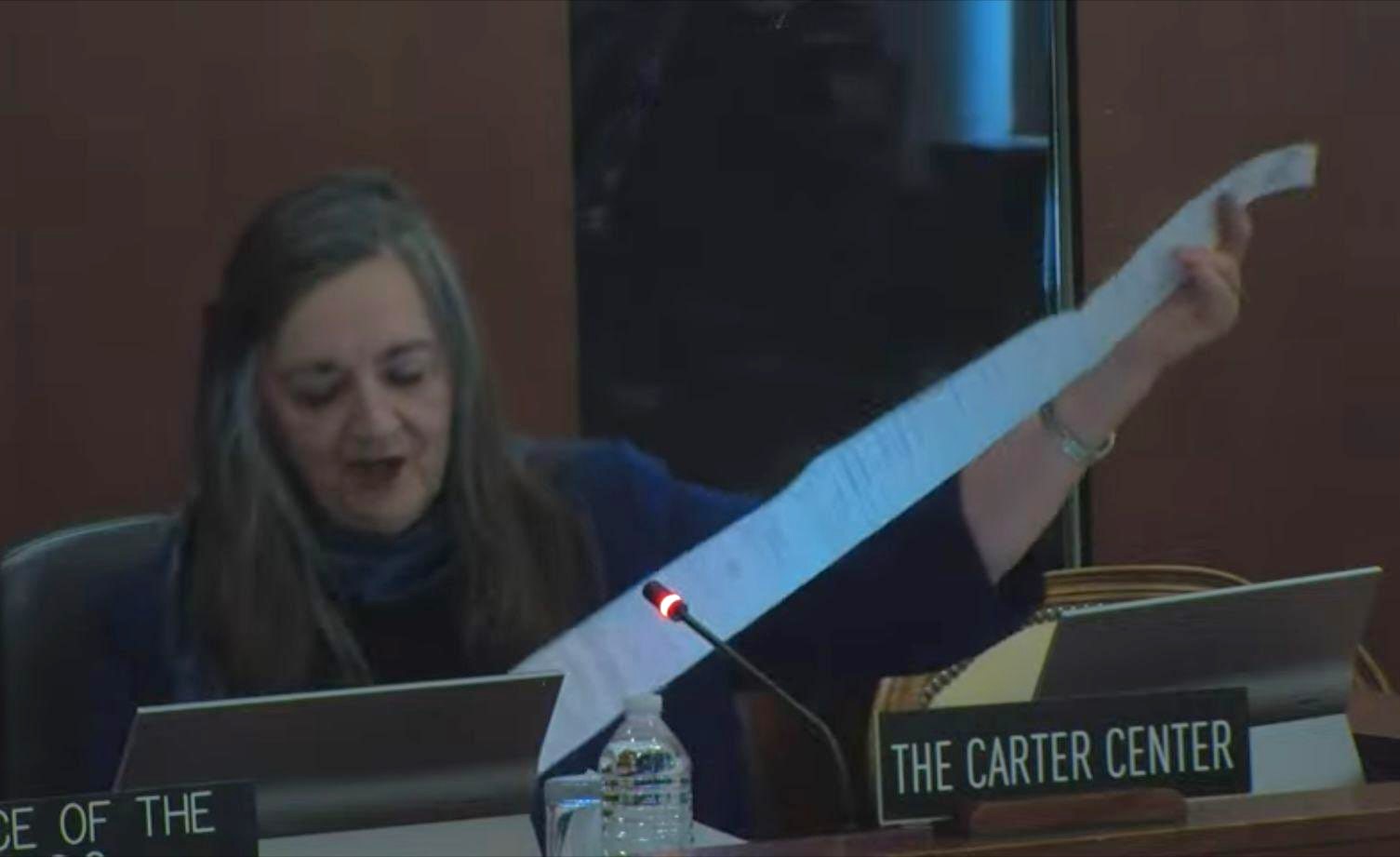The Carter Center announced that it received original copies of the records issued by the voting machines after the July 28 presidential elections in Venezuela and presented them to the Organization of American States.
Jennie K. Lincoln, analyst for Latin America at the Carter Center and leader of the delegation that was in Venezuela as part of the technical mission for the presidential elections of July 28, presented this Wednesday original copies of the minutes that the opposition kept and that They would demonstrate the triumph of former opposition presidential candidate Edmundo González Urrutia.
“These minutes are key elements. I just received the originals that were sent to me by international mail. These are original minutes from Venezuela that have a QR code, which is significant and that allows witnesses from thousands of tables to systematically collect information from the original data prepared by the CNE,” he said in an ordinary session of the Organization. of American States (OAS) where he defended the independence of the institution he represents.
“This is a key point, the voting system is electronic, but it has paper evidence of what the electronic machines report, and this is what thousands and thousands of witnesses collected, not only from the opposition, but also from the government party. which also has the same information,” he continued.
Two months after the presidential election, the National Electoral Council (CNE), which proclaimed Nicolás Maduro the winner for a third term, has not published the disaggregated results despite demands from the international community that has not recognized him as president-elect.
The opposition, which denounces electoral fraud after publishing copies of the original minutes that its witnesses kept at the polling stations, insists that the victory, with 67% of the votes, belonged to González Urrutia, currently in “forced” exile in Spain.
“The original minutes, that is, the ones I have here, were collected and analyzed. The opposition did it and so did independent observers who had the original Venezuelan data from the CNE that showed that Edmundo González had won the vote by 67% and Nicolás Maduro had achieved 31%, that is, more than two to one ”, he explained.
Lincoln recognized that the Venezuelan electoral system is “excellent,” and explained that it has two paper receipts (a record issued by the voting machine, which provides a summary of the polling station, and the ballot that the voter inserts into the box. after voting in the machine).
“The minutes are public documents that are sent to the CNE, copies of them are printed immediately at the table and are provided to all electoral witnesses of all political parties,” he explained.
Lincoln announced that they would soon present a detailed report, but announced that the voting system “worked.”
“The government of that country, including the CNE and Plan República (the military), the PSUV, the opposition political parties and all the witnesses of the elections, citizen observers of the 30,026 polling stations know what the true results of the election were. presidential,” he said.
The Carter Center, invited by the CNE as a result of the agreements signed by the government and the opposition in Barbados last year, stated that the contest “did not conform to international parameters and standards of electoral integrity,” so “it cannot be considered democratic.”
“The fact that the electoral authority has not announced results broken down by polling station constitutes a serious violation of electoral principles,” stated a statement released after the elections.
Maduro said the Carter Center report was previously written.
Lincoln insisted this Wednesday that observers “do not decide” the elections and that it is the responsibility of the electoral authorities.
“The lack of transparency of the Venezuelan CNE and its refusal to provide data from its machine tables and the minutes to explain the declaration of a winner does not meet international standards,” he insisted.
The preliminary report of the UN Panel of Electoral Experts, which was initially confidential and was finally published, stated that the electoral authority’s results management did not meet the “basic requirements of transparency and integrity” essential to holding credible elections. . The government claimed that the document is “riddled with lies.”
A ruling from the Electoral Chamber of the Supreme Court of Justice (TSJ) validated the disputed results, but the opposition previously said that any ruling is “null and void.”
The Electoral Chamber of the TSJ, an organization considered an appendix of the Executive Branch, admitted an appeal filed by Maduro to “investigate, verify and certify” the electoral results, a process in which no opposition witnesses or experts participated.
#Carter #Center #shows #original #copies #Venezuelan #presidential #election #minutes #OAS #Diario #Página

/img-s3.ilcdn.fi/45964520daa4935bafc3b5299485f67d05f92b7fe71716f1604d93428aab97cb.jpg)
